navy401 exam 1
1/72
There's no tags or description
Looks like no tags are added yet.
Name | Mastery | Learn | Test | Matching | Spaced | Call with Kai |
|---|
No analytics yet
Send a link to your students to track their progress
73 Terms
Leadership in Combat: 3 Way Problem
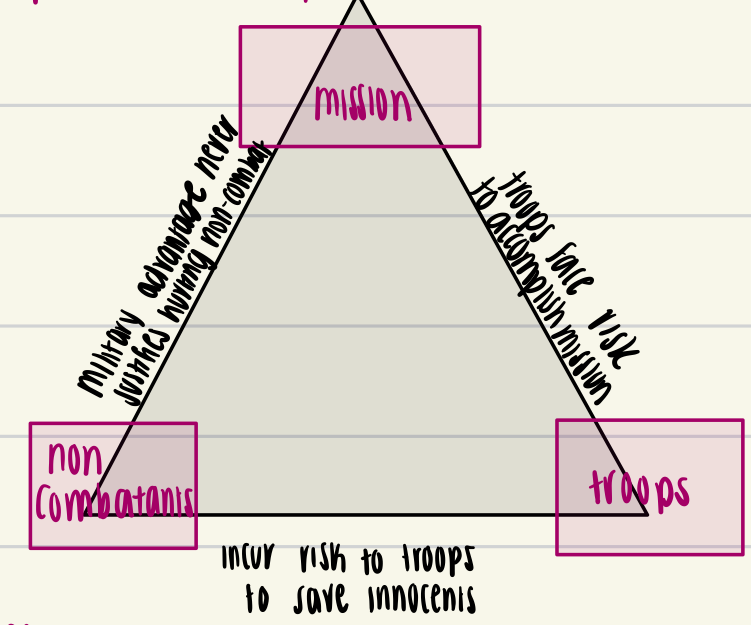
Narratives
Story of the community
Affected by the inner ring
Integrity
Made up of your principles and actions
Luban’s principles impact this
Luban’s High Road
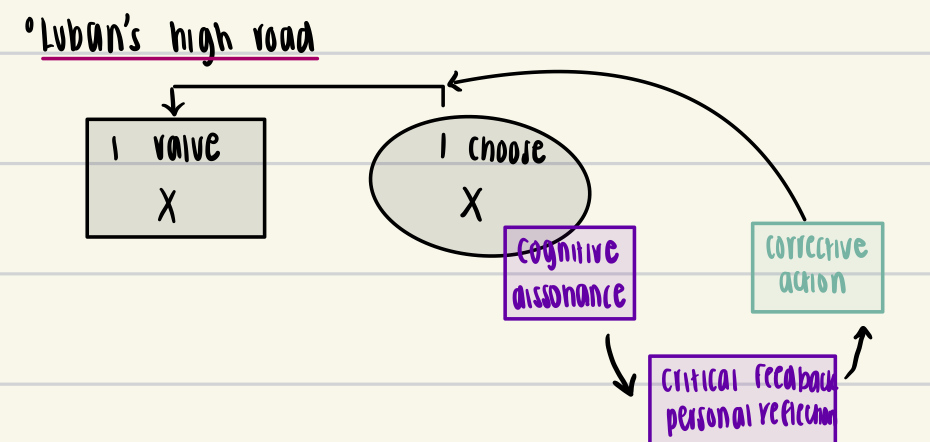
Luban’s Low Road
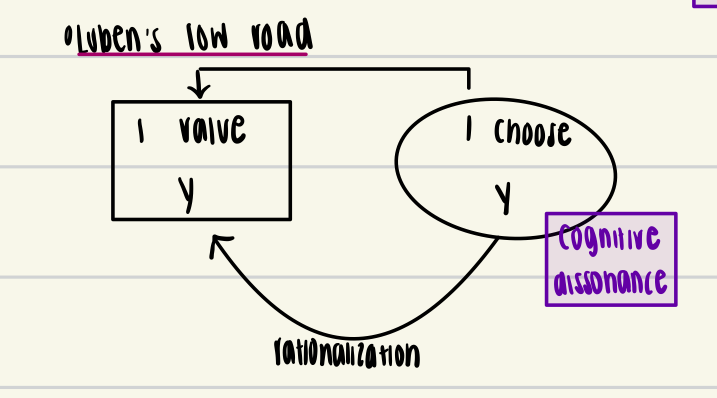
Rationalizations: Denial of Responsibility
“Come on man, I had no choice!”
Rationalizations: Denial of Injury
“It was no biggie, No one got hurt!”
Rationalizations: Denial of Victim
“They asked for it!”
Rationalizations: Social Weighting
“ Who the heck are you to criticize me?”
Rationalizations: Appeal to higher loyalties
“I answer to a higher cause”
Rationalizations: Metaphor of the ledger
“I’ve earned the right to do what I want”
Socialization Strategies: Co-Optation
Rewarding unethical behavior
Socialization Strategies: Incrementalization
Gradual exposure, so people can adjust, adapt and internalize what is expected over time
Socialization Strategies: Compromise
You do this for me, I’ll do this for you
The Moral Thermocline
Gap between our personal moral judgements and moral judgment we make considering the actions of others
To address these problems, we use Test of Integrity, or weigh the moral dilemma
Test of Integrity
I know the right (wrong) thing to do
Moral Dilemma
I don’t know the right (wrong) thing to do (Ethical decisions, like truth vs. loyalty, justice vs. mercy, etc.)
Moral Deliberation Roadmap
For Moral Dilemmas
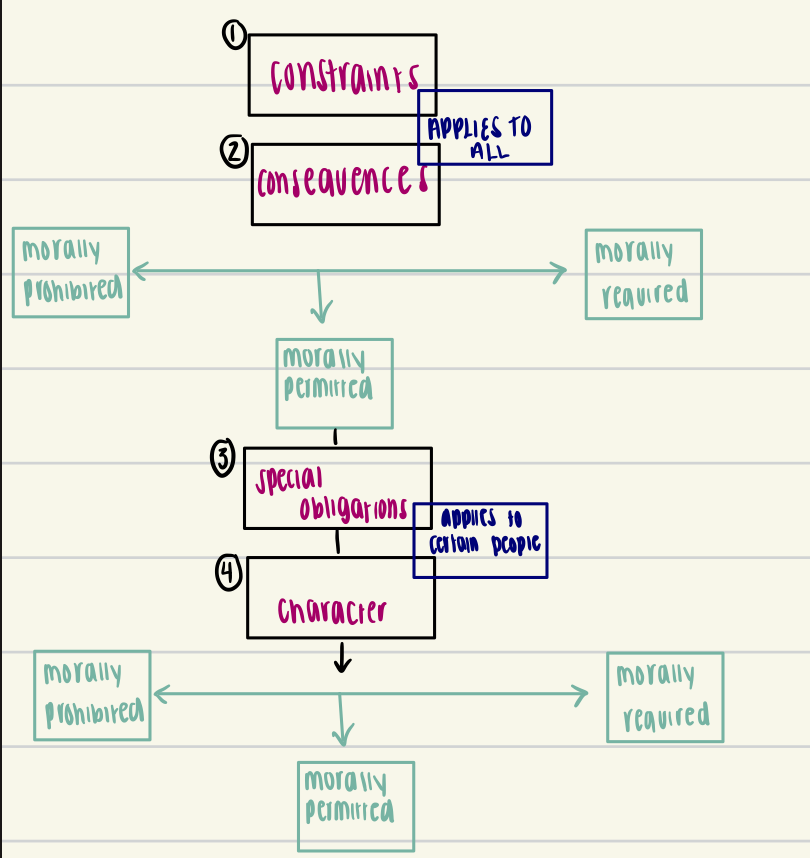
Moral Deliberation Roadmap: Constraints (1)
Does my action violate my duty to respect other people’s natural human rights
Can use Kant’s Categorical Imperative to analyze
Mere Means
Universalization
Intuition
Also, analyzing impacts with Doctrine of Double Effect
Universalization Test
Analyzes Constraints
Can I universalize my actions without logical contradictions?
Ex. It is okay to lie when it helps me avoid punishment. However, if everyone were to lie, trust collapses so we cannot rationalize it as a universal law
Mere Means Test
Would my policy treat others as ends in themselves?
Lying to someone to borrow money (knowing you won’t pay them back), using them to get money, without respecting their right to make an informed choice
Rights
An entitlement, not always dependent on desert (surrendered through choice or misconduct)
Can affect constraints
Intuition Test
Am I treating this person in a way that benefits equal dignity?
Would I want to admit this out loud to someone I respect?
Doctrine of Double Effect
If an action has two effects→ One good, one bad→ it can be morally permissible if the bad effect is not intentional, just foreseen if it follows PUMP
Permissible→Must be morally good or neutral
Unavoidable→ Bad effect is not intended
Means→ Is the bad effect the means to the good?
Proportional→ Good effect must outweigh the bad
Distributive Justice
Have I distributed the burdens and benefits of the community fairly?
Retributive Justice
Theory of justice that emphasizes punishment for wrongdoing as a morally appropriate response to crime
It is based on the idea that offenders deserve to be punished in proportion to the severity of their offense
Moral Deliberation Roadmap: Consequences (2)
An outcome is right/wrong based on outcomes alone
Egoism
Consequence
The outcome was best for me
Hedonism
Consequence
Outcome was the most pleasurable
Epicuranism
Consequence
Outcome was the one that avoided pain
Utilitarianism
Consequence that generates the greatest net happiness
Krauthammer’s Stance on Torture
Believed torture. to be morally required against terrorists with lifesaving info
Sullivan’s stance on torture
Believed torture is ALWAYS morally evil
Moral Deliberation Roadmap: Special Obligations (3)
Determined by Sandel’s 3 Categories of Moral Responsibilites
Sandel’s 3 Categories of Moral Responsibility
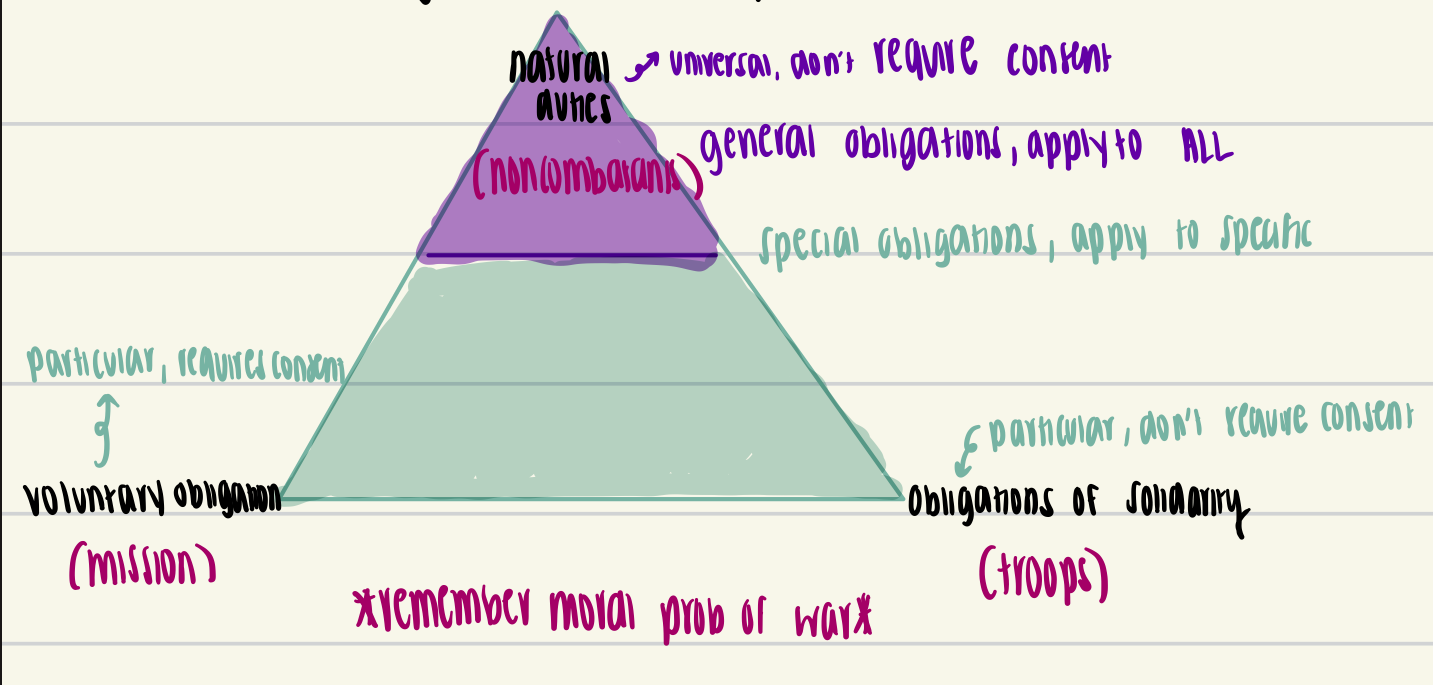
Constitutional Paradigm
Understand priority of loyalties (Should not change)
If loyalties conflict, resolve the conflict and THEN act
If conflicts cannot be resolved it may be because you are in the wrong line of work. Remove yourself
If you oppose a legal but immoral order, follow dissent and disobedience prerequisites.
Dissent and Disobedience Prerequisites
Non-Trivial
Try to fix it
Disobey in Public
Accept Consequences
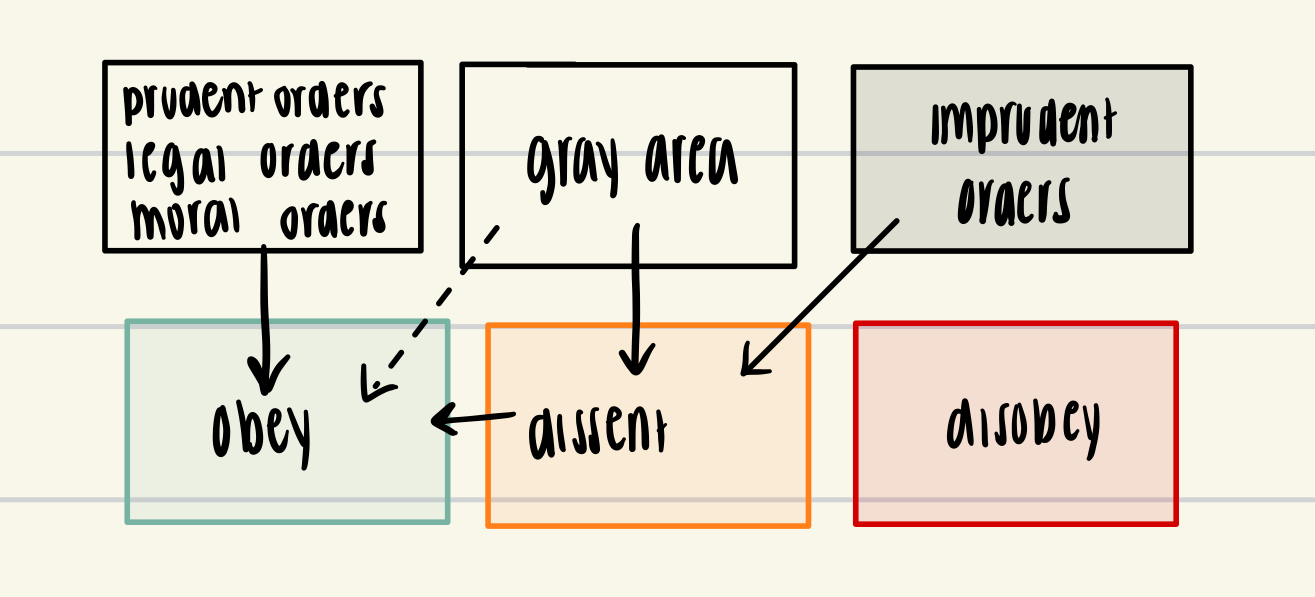
Moral Deliberation Roadmap: Character (4)
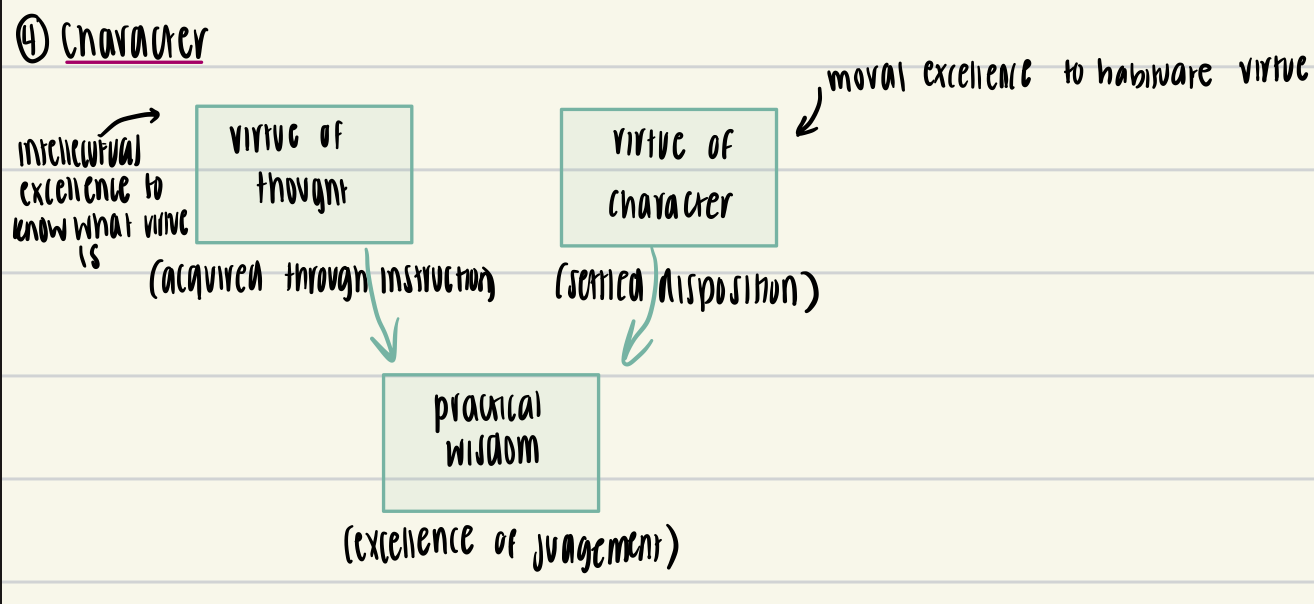
Aristotle Pride
Proper sense of one’s own worth
More about deserved pride based on actual excellence
Lewis Pride
Described as Superiority, Competition/Comparison
Seeks Power
Aristotle Humility
Small mindedness, Stands back from noble causes
Underestimates themself
Lewis Humility
Core value
Treating others as equals
Recognizing dependence on others, and god
Reflective Obediance
Obey after believing an order is just
Needs moral excellence
Coerced Obediance
Obey because forced to, no real choice is involved
Stockdale’s Self Mastery
His deepest fear wasn’t physical pain, it is moral collapse
Moral Integrity is your truest self
Epictetus Self Mastery
Character is your fortress real harm is when you betray the good man inside of you
Stocisim
Key to living a good life is living with virtue, reason and self control no matter what happens
Control what you can, accept what you cannot
Courage
Settled disposition to act courageously
Physical courage
Acting despite known risk of bodily harm
Moral courage
Acting despite known risk of social psychological, political or economic harm
Martial Courage
Acting with physical/moral courage while facing an enemy determined to destroy
Naval Core Values
Honor→ Accountability for personal/professional behavior
Courage→ Gives moral and mental strength to do what is right
Commitment→ Work together as a team to improve
PTSD
Triggered by life threatening or terrifying event.
Brain/Body reacting to threat and fear
Moral Injury
Wound to the soul/conscience
Caused by violating moral code, or witnessing something that goes against core values
Discipline
Control gained by enforcing obedience or order
orderly or prescribed conduct of pattern of behavior
self control
to train or develop by instruction/exercise especially in self-control
Counseling Process
Prepare for the session: observe and document behavior, gather all info for discussion
Create suitable conditions
research and explore the issue
move toward the goal of the session
monitor progress and follow up
Punishment
failure of discipline, imposed with the objective of improving performance
Operational risk management
the process of dealing with risk associated with military operations which include risk assessments, risk decision making and implementation of effective risk control
Process
Identify hazard
assess hazard
make risk decisions
implement controls
supervise, follow up evaluations of control
Right
something to which one can claim; a power of privilege to which one is justly entitled.
deserving of protection from and by the state.
give rise to the duty in others not to interfere with the exercise of it
liberty
the quality or state of being free; a right or immunity enjoyed by prescription or by grant
the right and power to act, believe or express oneself in a manner of one’s own choosing.
Disposition of UCMJ Violation
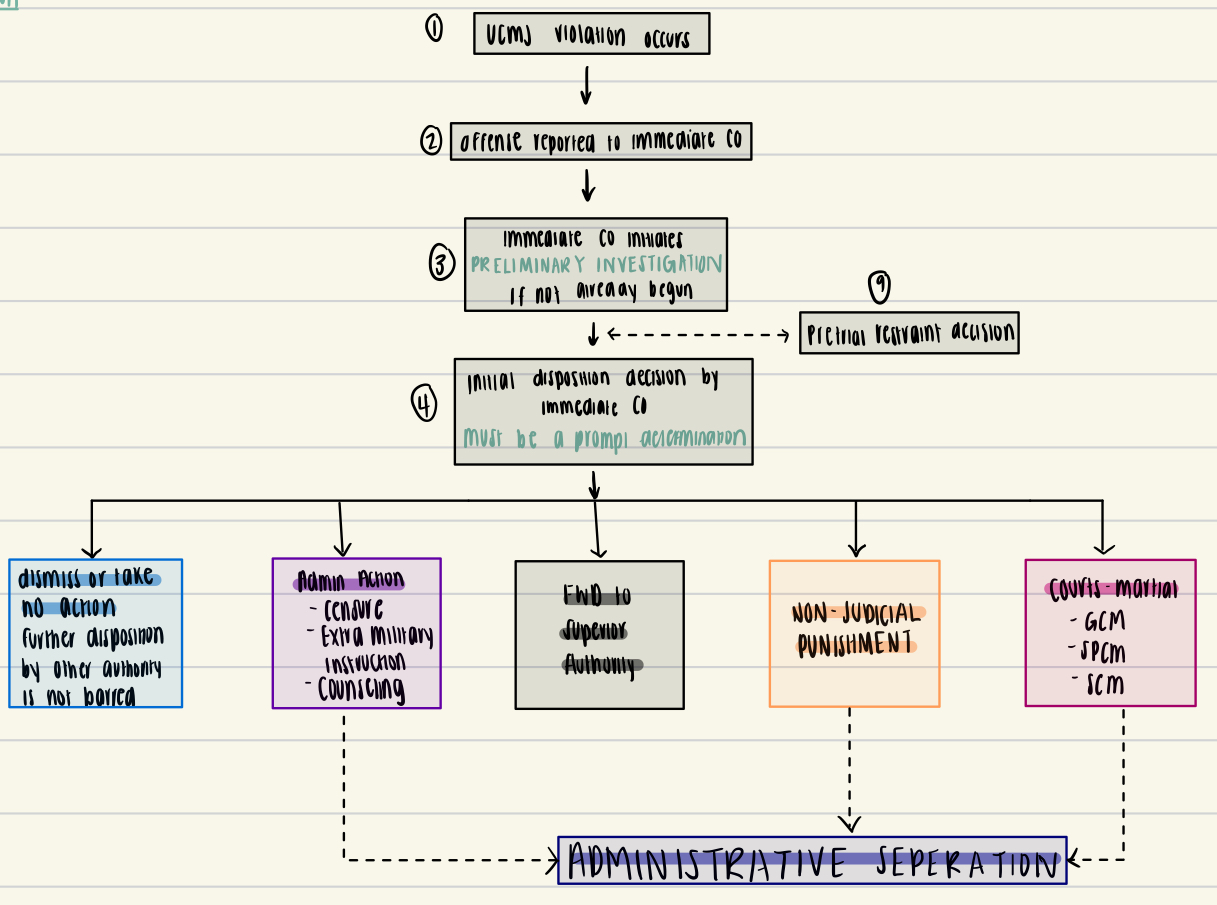
Courts Martial
formal legal trial
GCM
SPCM
SCM
No BCD
General Court martial
Most serious crimes, felonies
Similar to a grand jury
Special Court Martial
Mid-level, serious misdemeanors
There is a jury
Summary Court Martial
Minor Offenses
Non criminal, accused must consent
No BCD Court Martial
Military judge alone
Summary Flow of Military Justice
violation→ report→ preliminary investigation→CO decision→action branch→ admin seperation
Nonjudicial Punishment
Disciplinary process used to address minor offenses without sending to a formal court martial
Office Hours (USMC) and Captain’s Mast (NAVY)
NJP Process
Someone is accused of committing an offense
Preliminary investigation
CMC holds a discipline review board
Xo inquiry, makes reccomendion
Captain mast/ office hours→ co weighs evidence and makes decision
Appeals process if desired
Military Court Appeals Process
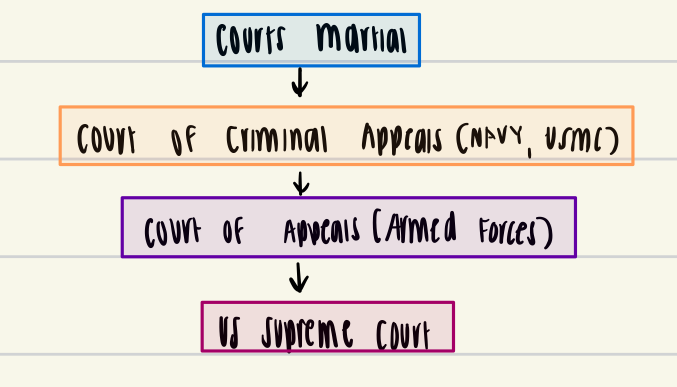
Jus ad Bellum
Justice to War
Preemptive → war waged in the face of imminent attack of aggression
Preventive→ War waged to eliminate/mitigate potential threats
War must be declared by legitamate authority
War must be fought in pursuit of a just cause
War must be fought with the right intention
last resort
likelihood of success
must be proportionality of ends
Jus ad Bello
Justice in war
Applies to political leaders/soldiers
Discrimination between combatants/noncombatants
proportionality of force
military necessity
fair treatments of prisoners of war
no evil in themselves, no evil weapons
Five moral challenges of modern war
Moral numbing→ has killing become too mechanical?
Moral frustration→ if our adversaries don’t play by the rules why should we?
Preserve the consequences of doing good→ Can strictly following ethical rules put you at a disadvantage
Preserve the consequence of risk aversion→ Can force protection be a strategic liability for western forces
legalization of ethical reasoning→ if the jag says its legal than its moral… right?